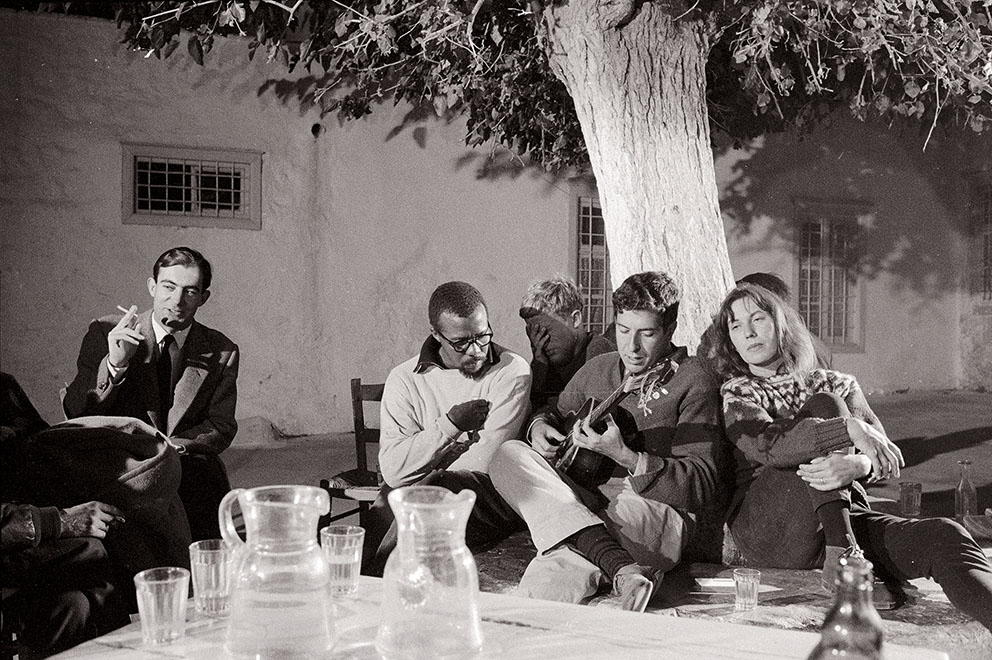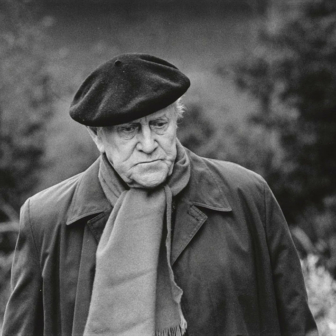Hydra’s harbour, horseshoe-shaped and packed with luxury yachts, is like a toy version of the harbours on other Greek islands. Its streets are too narrow for cars, so horses, donkeys and the occasional hand trolley carry everything – tourists’ baggage, fruit and vegetables, bottles of water – up narrow white streets lined with tiny white houses.
The place must have changed since the 1960s; it gleams in the sunlight as if fresh-painted, and the cafes and taverns along the seafront are set up to match tourist dreams of the easy life. But Brian, an Australian who came to live here in the 1970s, tells me that most houses still have no sewerage beyond septic tanks, and water is scarce. Tourists seem to confine themselves to the few blocks near the water’s edge, happy just to eat the delicious Greek food and look up at the stony hills in the distance.
We’ve come to honour the writers George Johnston and Charmian Clift, who lived in Hydra from 1955 until 1964 at the centre of an assorted collection of artists and writers, Australian, English, Canadian, American, German, Scandinavian and Greek. Paul Genoni from Curtin University and Tanya Dalziell from the University of Western Australia have organised a conference here, so we’ve gathered at the Bratsera Hotel to talk about the significance of Clift’s and Johnston’s work and friendships.
It seems like the greatest excuse ever for an escape to an idyllic resort – and as it happens, people commonly assumed that Johnston and Clift were escaping, too, in their case from the tough realities of postwar Australia. They both complained about uninvited visits from passing Australians who wanted to take a stickybeak at their lives – a charge that may rebound on us as we poke around among their old haunts, though the writers themselves can no longer complain.
The current owner of the house in which Johnston and Clift lived has generously allowed us to hold a reception in his courtyard and wander through the now rather stylish house. The old well where the local women gathered water is still there outside the walled garden. It all looks so beautiful it is easy to forget the poverty and hard work, the difficulties of bringing up children in such sparse conditions, and the ominous evidence of Johnston’s incipient tuberculosis.
We view a visual tribute to Charmian Clift by Yianni and Micky Papapetros, based on the ABC radio documentary Persona: The Parallel Lives of Charmian Clift, which reminds us of her brilliance and beauty and her sad end back in Australia. Some of the conference papers are accompanied by vivid black-and-white photographs of the famous or forgotten figures who visited – American poet Allen Ginsberg, the New Zealand journalist Redmond “Bim” Wallis, a youthful Mungo MacCallum carrying a baby in a basket. Diana Thomas’s paper on the novelist Pat Flower is accompanied by a photograph of Flower in Provence with a youthful Margaret Olley, who appears to be wearing pedal pushers.
The best-known of these photographs include James Burke’s Life magazine pictures of Leonard Cohen playing guitar with Clift and others under the olive tree at Douskos Taverna. As a child, Rosemary Burke accompanied her father on his visit to Hydra, and she has come back to help us understand her father’s photographs; she also takes the opportunity to re-enact their ride over the Hydra ridges on horseback.
We have enough celebrity fandom to have our photos taken under the same tree at Douskos’s (the waiter insists that we pose under the olive tree of the Burke photos, though some of us also want to sit under the pine tree of Cohen’s poem about it). Yet the whole enterprise has a bittersweet quality. We’ve read enough of the books and essays to know how much the couple struggled to survive through their writing. Hydra’s chief attraction was that it was a cheap place to live and Clift, in particular, bore the brunt of its lack of domestic amenity.
Of course, most of the photographs show them at leisure, hanging around the harbourfront cafes with friends, drinking and singing in the tavernas, shopping in the markets, sailing around the Aegean on the yachts of their richer friends. Apart from George, they are all young and beautiful, laughing for the camera. In every photograph the tubercular George has a cigarette in his hand. The hard graft of writing and selling books is easy to forget.
Like Bim Wallis and some of the unidentified figures in the photographs (“Who was that?” “Just a German who wanted to write”), Johnston and Clift might have been forgotten if My Brother Jack had not stirred such a response of recognition among Australian readers. It won the Miles Franklin award in 1964, providing enough money for George to return home; Charmian and their three children had to follow by ship as £10 migrants.
The novel is, of course, set far from Hydra in a Melbourne where war had been followed by the Great Depression, which led to shifts in aspirations as Australia entered another international conflict. Like James Joyce writing about Dublin from Paris, Johnston, with Clift’s help, had to conjure up all his memories of the places and language of his past. Brigid Rooney produced a photograph of the model for the hated suburban house in “Beverley Grove,” now in a comfortable tree-lined street in desirable Brighton.
Clean Straw for Nothing, the sequel to My Brother Jack, is the novel of their Hydra lives. It also won a Miles Franklin award, but its account of the struggle by Johnston’s fictional counterpart, David Meredith, to make a living, his physical decline and his obsession with his wife’s infidelity makes for painful reading. Some characters seem to correspond with members of the Hydra crowd – the artist Sidney Nolan and the actor Peter Finch, among others. It may be accurate in its account of the activities and intrigues of the expatriate community, but it couldn’t draw sympathy from Australian readers in the way of My Brother Jack, which seems to say necessary things about the aftermath of the first world war and its damage to returned soldiers and their families, and the prospects for a newly revived postwar Australia.
Johnston may have been expressing his own dissatisfaction with the limits of suburban Australian life in My Brother Jack, but Australian readers, even those of subsequent generations, recognise the novel’s aptness to the raw suburbs of their own experience. Several conference-goers commented that Johnston’s version of Beverley Grove in the 1930s corresponded to their feelings about the new suburbs of Western Sydney in the 1960s or of Canberra in the 1970s.
In retrospect, it seems that Sydney was a more congenial place than Greece for Johnston’s and Clift’s writing careers. While the novels they churned out on Hydra have mostly been forgotten, the first two novels of Johnston’s David Meredith trilogy were acclaimed and Clift won a devoted following for her informed and perceptive columns for the Sydney Morning Herald. Reading these columns today, they appear to monitor the changes in Australian attitudes – towards the Vietnam war, music and dress, relations with Aboriginal people, and occasionally even the current crises in Greek politics. It seems that their decade in Greece gave both writers a sharper insight into the desire among many Australians to throw off our ignorance about the world, the energetic cultural rebellion of the young, and the mix of kindness and prejudice in the old generation.
Beate Josephi drew attention to Johnston’s war novel The Far Road, published immediately before My Brother Jack; and there was discussion of the brilliance of earlier journalistic works, including Journey to Tomorrow (1947), and the importance of his experience of China and Tibet as a journalist at the end of the war – including his journey with James Burke to Tibet. Clearly he is a writer whose work beyond My Brother Jack deserves rereading.
The posthumously published A Cartload of Clay, the third of the David Meredith novels, now strikes me as an extraordinary portrayal of changes in Australian life. Like one of Patrick White’s novels of postwar Sydney, it observes suburban life, including the coarse vulgarity of an Australian “ocker” and the bright materialism of the young women, as its protagonist wanders the streets of Mosman thinking about his career and the death of his wife.
Now, of course, that novel can’t be read without awareness of Clift’s suicide in 1969 and Johnston’s death a year later. Clift’s last column, published after her death on the eve of the release of Clean Straw for Nothing, referred to her own claims on the material in Johnston’s novel and her desire to tell her own version of the story. So the relationship between their lives and their fiction can never be unravelled. Inevitably, what we think we know about their lives and their difficult marriage – based on their own writings – eclipses the writing itself.
Early death from tuberculosis, barbiturates and alcohol is far from glamorous. Yet the photographs, the food and the simplicity of Greek life, which Clift described so vividly in Mermaid Singing and Peel Me a Lotus, give an inerasable air of glamour to the couple. Online there is even a clip of George and Charmian and their children as extras in a Tony Randall movie set on Hydra, called Island of Love. They were stars, of a kind, and their early deaths leave a sense of potential unrealised.
One of the paradoxes of the period when Johnston and Clift lived on Hydra is that it marked the beginning of the greatest migration of Greeks to Australia. While the writers sought peace on a Greek island, thousands of Greeks were leaving their country in despair. As we visit, the Greek people are again suffering from a declining economy and coping with tens of thousands of refugees fleeing Syria. Many of the shops in Athens are boarded up, and the refugees are noticeable around the Port of Piraeus and in the outer suburbs, though they are kept away from the tourist havens. On Hydra, we appear to be in a dream, apart from political realities, Greek or Australian, and the locals treat us with hospitality and kindness. The disjunctions between the Australian dream of island simplicity and the realities of Greek life remain. •




